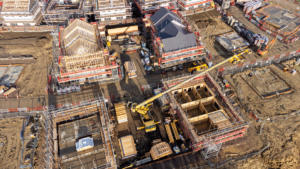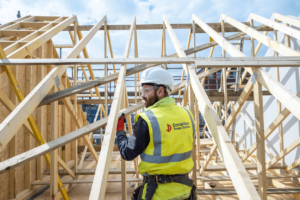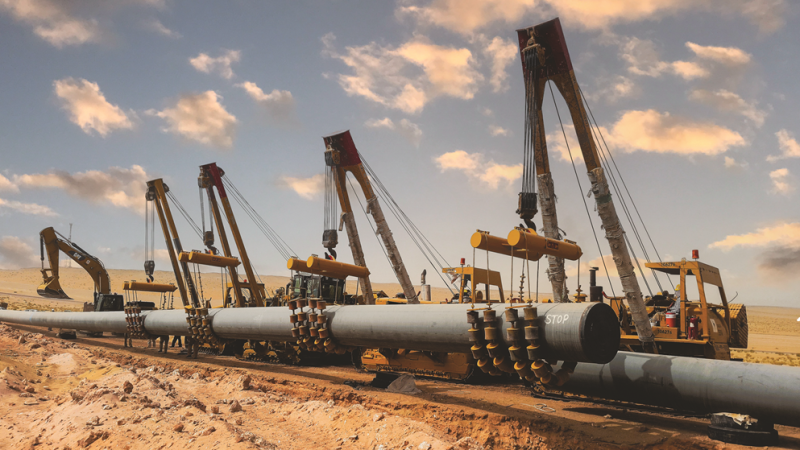Donaldson Timber Systems (DTS) is an independent, off-site specialist in the design, manufacture, and installation of timber-based build systems. With nearly 50 years of experience behind it, the company provides full UK coverage focussed on the house building sector. It is not only the largest timber frame manufacturer in the UK but is also part of one of the largest independent timber groups in the UK, the Donaldson Group, a family business which has been trading for 163 years.
“A few things make us unique. Our range, our heritage, and our experience are key,” says John Smith, Donaldson Timber Systems’ Technical Director. “We use what is called ‘modern methods of construction’, but we have been using them for 50 years now. That gives us the knowledge, experience, and background to know we are doing the right thing.”
That knowledge is verified. The DTS product range is fully tested, and fully third-party certified, which is a rare claim to be able to make in the sector.
“It is relatively unique, but it is also increasingly important in advanced building systems and technical requirements,” Smith points out. “Third-party certification is important for ourselves and our customers.”
 Building Relationships
Building Relationships
It is also important that Donaldson Timber Systems can offer its products and services anywhere in the country. It can serve construction projects from the North of Scotland to the very South of England, but despite operating nationwide, the firm also maintains local relationships with its supply chain and customers.
As Smith points out, “This is possible thanks to the strategic partners we work with. We work with customers nationwide, but at a local level we have sales, technical, commercial and construction experts that are locally based and build relationships with the customers in that region.”
Those relationships are all the more important given how volatile the housing construction sector has recently been at both ends – from raw materials to the housing market and sales rates.
“If you talk to anybody in the industry right now, they will talk about the volatility in the housing market, the lack of a clear pipeline, and that continues to be a challenge,” Smith says. “The whole construction sector has seen raw material shortages, extraordinary, material and transport cost increases. These have all been a challenge.”
DTS has navigated these challenges thanks to those strategic relationships with key partners, big and small.
“We work with local and regional customers doing a handful of plots as well as national housebuilders across the UK,” Smith tells us. “We have also got long-term relationships with key supply chain partners. Our scale allows us to deal directly with material manufacturers, which not only cuts down on costs for third-party distribution but also allows us to share key information on specifications and volume forecasts. Many of our suppliers have been with us for a long time, and some for well over 20 years. We stick with them, using only two or three per commodity. It means we never run out of product, and we always have access to supply.”
The benefits roll down the supply chain, allowing Donaldson Timber System’s customers to rely on them, and maintaining those relationships.
Beyond our supply chain and customers, DTS has also built up close relations with a number of test facilities, and certification bodies and have a full suite of third-party certification in place. “With new build standards pushing the performance of homes forward quicker than ever, the industry is rightly reacting to this with new and innovative solutions. This is where third-party certification is vital to ensure advanced build system will achieve their stated performance, are durable and fully fire and structurally tested. Our Sigma II build system has BBA, BOPAS+, NHBC Accepts and TRADA Q-Mark certifications in place, offering peace of mind for people who are building and those who will own and/or live in the homes we build.
Grow Your Own
As important as the supplier and customer relationships are, the relationships within the company itself are equally important, particularly as Donaldson Timber Systems has been undergoing a period of growth over the last ten years.
“We have always had a grow-our-own mentality. We have 25 apprentices and trainees performing various functions across the business,” Smith says. “We have also developed an apprenticeship scheme with West Herts College for our site installation partners because those skills are not typically taught as a trade.”
It is not just about recruiting talent but nurturing and retaining that talent. 21% of Donaldson Timber Systems’ total staff have been with the company for more than a decade. The company also employs ten people with a service record of over 30 years.
 “There are a lot of opportunities within the business for development and promotion from within,” Smith tells us.
“There are a lot of opportunities within the business for development and promotion from within,” Smith tells us.
That training is not confined to the firm’s own staff, however.
“We are also training our customers and their suppliers or sub-contractors in how to build with the system that we have been using for years,” Smith says. “We have two people within the business working full-time providing CPD-certified training for our customers.”
But while that grow-your-own mentality is a key part of the business’s approach, the company is not afraid to bring in expertise from other businesses, even other industries.
“We have got a board of six directors, three are internal appointments who came up through the business, and three are relatively new but came from different business sectors to give us a wide range of experience to draw from,” explains Smith. “Senior management is the same, with eight senior managers, 50% of whom have been promoted from within the business. We are also happy to look beyond our industry. With the investment, we are making in our manufacturing centre in Witney now, and across our other facilities in the future, we are using new, more advanced technology. We have people from BMW and Honda with more advanced manufacturing technology, helping us to embed that investment in the business.”
Those technological developments are a key part of Donaldson’s vision for the future of the business, introducing tools such as laser projection technology and even augmented reality.
“We are replacing paper drawings and tape measures with CAD files and information displayed through laser projection directly onto the product being manufactured,” Smith points out. “It means the people running the production lines do not need to stop and look at drawings, they can see exactly what to fit and exactly where to fit it. We have looked at augmented reality goggles and hard hats that let workers see drawings and information. All these things are starting to advance, and we want to be at the forefront of that. Once we have developed these in our manufacturing centres, we will roll them out on our sites as well.”
By ensuring its people have access to the latest tools, DTS can fuel its future growth.
“We have got manufacturing technology investments in Witney, a new manufacturing facility planned in Scotland, and a new ERP system for the business that is in the final stages of implementation,” says Smith. “We will keep developing our product and system offering to keep ahead of the market. We have a good history of that, building the UK’s first code level 5 houses of what was known as the Code for Sustainable Homes back in 2007. Since then, we have been developing our Sigma II build system, and have 15 years of knowledge and improvements to the system which is ideally suited to meet the requirements of future building standards in 2025 and beyond.”
As sustainability continues to be an ever-more critical priority, Smith cannot overstate the importance of timber construction.
“Timber has a vital role in sustainability. It is the only truly renewable building material,” he says. “Many can be recycled, but we always can and should grow more trees to absorb carbon dioxide and store that carbon within the timber. Building a new home with a timber build system saves on average 6 tonnes of carbon compared to a masonry solution, so if even half of the government’s target of 340,000 homes per year were built using timber, we would save over 1 million tons of carbon every year. The more we do with timber the better it is for the planet.”





